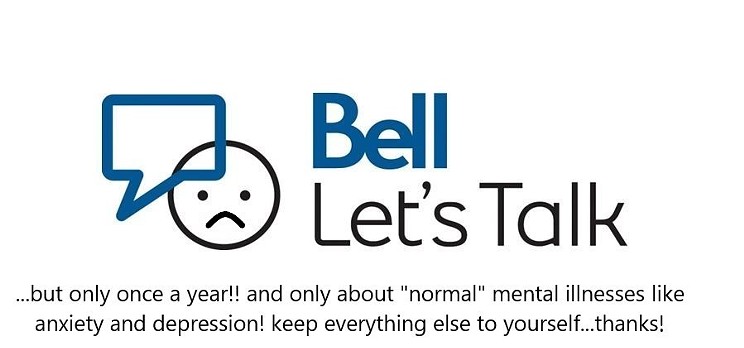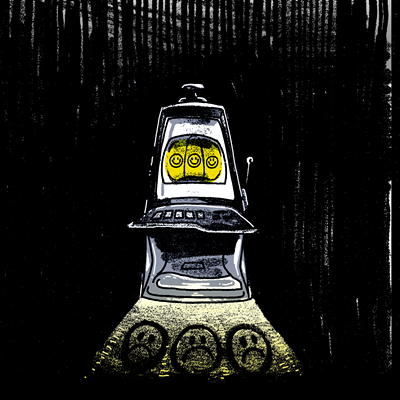Today is the day. The day I mute every thinkable combination of words and hashtags across all social media platforms. The day I turn off the television and radio and anything that could have advertisements. The day I wonder if I can detach my retinas by rolling my eyes too hard. Today is Bell Let’s Talk day.
The day was created over a decade ago by national telecommunications company Bell Canada, which also operates Virgin Mobile and, in Atlantic Canada, the Bell subsidiary Bell Aliant. The concept is that for every text message or phone call through Bell, up to 10 cents is donated to mental health initiatives. This has grown to hashtags and posting on social media, all while including the Bell name in every single post.
Bell Let’s Talk’s donations have exceeded $100 million in the last 10 years to mental health programs, supports and scholarships. I’ll reword. Your donations using Bell Let’s Talk have exceeded $100 million in the last 10 years to mental health programs, supports and scholarships. In that same time period, Bell made a good name for itself and made (by a very reserved estimate) $30 billion in profit.
It can’t be denied that Bell Let’s Talk has opened up a day of dialogue about mental illness and mental health in Canada. Those who are uncomfortable speaking about their mental health struggles are more likely to reach out when there's directed conversation. But who’s keeping up the conversation? Us. Bell isn’t responding with personal stories about overcoming struggles. It’s everyday people across the country who are responding and supporting others with personal stories.
Bell Let’s Talk uses notable (mostly white) Canadian personalities to speak directly and reach out to Canadians. This is where my retinas begin to detach. I won’t invalidate a single person's experience with mental illness, but showing me a successful person who can afford therapy, good food and not be drowning in consumer debt gives less of a They did it and so can I! vibe than an Oh, they are successful and still bound enough to their mental illness to speak about it vibe.
Let’s Talk treads water by touching on more destigmatized mental illnesses like depression and anxiety. The destigmatization of these illnesses has shown growth in our conversations as a society, but the last two pandemic years proved to many that the experience of depression and anxiety is not finite. We have all had a sampling of what millions of Canadians have battled, and out of unfortunate circumstances have formed an understanding. Similarly, the entire Bell Let’s Talk campaign is built on the backs of those who have or have watched people struggle with mental illness.
It’s true Bell has facilitated and prompted a conversation—but it wins free advertising and social clout via our lived experiences. Bell’s exploitation is thinly veiled in performative leadership: an ad campaign using our suffering for donations, led by a company that makes billions of dollars a year.
Friends, let's actually talk. Let's be uncomfortable and actually talk about mental illnesses. Let's talk about bipolar disorder, cyclothymic disorder, schizophrenia and all the other disorders that aren't written into everyday storylines.
Let's write our MPs about struggles we see in our communities. Let's write our MLAs about access to services and wait times for supports. Let's speak to our employers about sick days. A mental health day isn't necessarily someone feeling “off”. It could be the difference between a person becoming manic or not. It could be a day where someone only sees rooms filled with smoke and needs to access care. It could be someone struggling with executive dysfunction and the task of turning on their coffee machine in the morning exhausted their mental capacity for the day.
Let's address racism, sexual harassment, abuse and toxic masculinity, all serious contributing factors of mental illness and suicide that are built directly into our systems and society.
Let's hold ourselves accountable. Check on friends. Ask what they want or need, and accept that the answer could be “to be left alone.” If you have some extra cash, drop off staple groceries to make sure your friends have money for medication. If you're trying to help someone, try to get input and advice from someone who has expertise or experience. Mental illness is complex and sensitive, and even with good intentions, Googling isn't enough.
And friends, reach out. If you are struggling please reach out. You are seen and you are loved and you are worth waiting for. Calling 902-429-8167 (toll-free) will connect you to the Halifax Mental Health Mobile Crisis Team. Talk is cheap (about 10 cents) but action is gold.
Katy Jean is a freelance columnist and writer based in Dartmouth. They spend roughly 29 hours a day on Twitter under the handle @katynotie.
















